|
|
|
Sort Order |
|
|
|
Items / Page
|
|
|
|
|
|
|
| Srl | Item |
| 1 |
ID:
127066
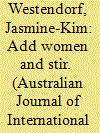

|
|
|
|
|
| Publication |
2013.
|
| Summary/Abstract |
With the changing nature of warfare and the increasing awareness of the specific gender dimensions of war and peace, the international legal framework has been expanded to address the particular challenges faced by women in conflict and post-conflict contexts. This process culminated in 2000 with the first United Nations document to explicitly address the role and needs of women in peace processes: United Nations Security Council Resolution (UNSCR) 1325 on women, peace and security. Thirteen years on, this article assesses the extent to which Australia's stated commitment to women, peace and security principles at the level of the international norm has translated into meaningful action on the ground in the Regional Assistance Mission to Solomon Islands (RAMSI). The analysis shows that despite it being an ideal context for a mission informed by UNSCR 1325, and Australia being strongly committed to the resolution's principles and implementation, the mission did not unfold in a manner that fulfilled Australia's obligations under UNSCR 1325. The RAMSI case highlights the difficulty in getting new security issues afforded adequate attention in the traditional security sphere, suggesting that while an overarching policy framework would be beneficial, it may not address all the challenges inherent in implementing resolutions such as UNSCR 1325
|
|
|
|
|
|
|
|
|
|
|
|
|
|
|
|
| 2 |
ID:
173419
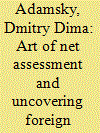

|
|
|
|
|
| Summary/Abstract |
Andrew W. Marshall, who shaped the way in which contemporary international security experts think about strategy, has been mostly associated with the invention of net assessment. The intellectual sources of this analytical technique, and of the related competitive strategies concept, could be traced to Marshall’s efforts to uncover Soviet post-World War II defense transformations. This article outlines the essence of these Soviet innovations – the empirical frame of reference that inspired Marshall. It provides a new perspective on the history of the net-assessment methodology, advances the debate within strategic studies over the nature of military innovations, and offers insights for experts examining defense transformations worldwide.
|
|
|
|
|
|
|
|
|
|
|
|
|
|
|
|
| 3 |
ID:
101830
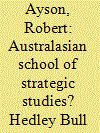

|
|
|
|
|
| Publication |
2011.
|
| Summary/Abstract |
To the extent that there is a distinctively Australasian school of strategic studies it is to be found in the work of Hedley Bull, a scholar who is more widely noted for his work as an international relations theorist. Bull's lesser known but influential contributions to strategic studies dealt with the management of nuclear weapons in international strategic relationships and the management of great power relations in the Asia-Pacific region. His work in these areas, while less well known than some of his other writings, deserves contemporary attention as strategic change in Asia increasingly shapes the international strategic picture, thereby creating the opportunity for Australasian strategic analysts to influence the global debate.
|
|
|
|
|
|
|
|
|
|
|
|
|
|
|
|
| 4 |
ID:
183513


|
|
|
|
|
| Summary/Abstract |
Australian strategic studies scholars have traditionally made an outsized impact on the world stage. This reflection upon the past, present and future of their field begins by seeking to explain why. It then takes stock of Australian strategic studies today, finding a flourishing field that stacks up remarkably well, even when measured against the exploits of its illustrious past. The essay concludes by identifying the main challenges and opportunities facing Australian strategic studies going forward, suggesting possible approaches for addressing these.
|
|
|
|
|
|
|
|
|
|
|
|
|
|
|
|
| 5 |
ID:
185831
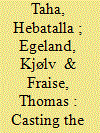

|
|
|
|
|
| Summary/Abstract |
Looming decisions on arms control and strategic weapon procurements in a range of nuclear-armed states are set to shape the international security environment for decades to come. In this context, it is crucial to understand the concepts, theories, and debates that condition nuclear policymaking. This review essay dissects the four editions of The Evolution of Nuclear Strategy, the authoritative intellectual history of its subject. Using this widely acclaimed work as a looking glass into the broader field of nuclear security studies, we interrogate the field's underlying assumptions and question the correspondence between theory and practice in the realm of nuclear policy. The study of nuclear strategy, we maintain, remains largely committed to an interpretive approach that invites analysts to search for universal axioms and to abstract strategic arguments from the precise circumstances of their occurrence. While this approach is useful for analysing the locutionary dimension of strategic debates, it risks obscuring the power structures, vested interests, and illocutionary forces shaping nuclear discourse. In the conclusion, we lay out avenues for future scholarship.
|
|
|
|
|
|
|
|
|
|
|
|
|
|
|
|
| 6 |
ID:
128874
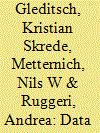

|
|
|
|
|
| Publication |
2014.
|
| Summary/Abstract |
We highlight how efforts to collect systematic data on conflict have helped foster progress in peace and conflict research. The Journal of Peace Research has played a key role in these developments, and has become a leading outlet for the new wave of disaggregated conflict data. We survey progress in the development of conflict data and how this interacts with theory development and progress in research, drawing specifically on examples from the move towards a greater focus on disaggregation and agency in conflict research. We focus on disaggregation in three specific dimensions, namely the resolution of conflict data, agency in conflict data, and the specific strategies used in conflict, and we also discuss new efforts to study conflict processes beyond the use of violence. We look ahead to new challenges in conflict research and how data developments and the emergence of 'big data' push us to think harder about types of conflict, agency, and the 'right' level of aggregation for querying data and evaluating specific theories.
|
|
|
|
|
|
|
|
|
|
|
|
|
|
|
|
| 7 |
ID:
074101
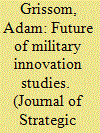

|
|
|
|
|
| Publication |
2006.
|
| Summary/Abstract |
This article assesses the state of the art in military innovation research. It begins with a description of the field's four major schools of thought, summarizing their central tenets, key points of similarity and differentiation, and major empirical cases. It then addresses priorities for future research, observing that while much has been learned about innovation originating among senior officers and civilian policy-makers, far less is known about innovation originating in field formations. Recent empirical studies hint at the importance of such bottom-up innovation but little progress has been made in achieving a conceptual understanding of the phenomenon. Therein lies the next major challenge, and opportunity, for the field.
|
|
|
|
|
|
|
|
|
|
|
|
|
|
|
|
| 8 |
ID:
153043
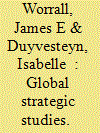

|
|
|
|
|
| Summary/Abstract |
This contribution reflects on the state of strategic studies today and the criticism it has received in recent years, as being outdated and irrelevant. The authors formulate some premises for reinvigorating this field of inquiry by widening its scope and research agenda to do more justice to the wide variety of actors, perspectives and practices observable in the enterprise of strategy in our contemporary globalised world.
|
|
|
|
|
|
|
|
|
|
|
|
|
|
|
|
| 9 |
ID:
193166
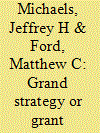

|
|
|
|
|
| Summary/Abstract |
The relationship between Strategic Studies and the American academy has always been a tenuous one. Tolerated when fully funded, the field quickly lost its place on campus when it failed to attract grant money. Only with the support of philanthropic foundations did it manage to gain a foothold in American universities. What emerges from our investigation is how the field has feasted during times when foundation money was available and suffered periods of famine when these funds were withdrawn. In addition, we show that during and immediately after the Cold War, the political interests of philanthropic foundations were broadly balanced. By contrast, over the last two decades, the field has been increasingly linked to financial support provided by politically right-leaning foundations. This is happening while funding from more centrist and left-leaning foundations has become much less prominent. When looking ahead at the field’s future health, we cannot but help be concerned about the implications of this development.
|
|
|
|
|
|
|
|
|
|
|
|
|
|
|
|
| 10 |
ID:
101482
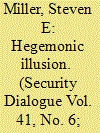

|
|
|
|
|
| Publication |
2010.
|
| Summary/Abstract |
At the heart of Buzan & Hansen's (2009) narrative is a conflict dynamic that pits traditional strategic studies, narrow and overly militarized but dominant, against a diverse set of challengers who aim to widen and deepen the field. Gradually, the challengers erode the hegemonic position of the traditionalists. This analysis reflects the assumptions, premises, and perceptions that Buzan & Hansen bring to this project as protagonists in the camp of the challengers. The present article offers a traditionalist response to this narrative, suggesting that the evolution of the field looks very different when viewed through the lens of traditional strategic studies.
|
|
|
|
|
|
|
|
|
|
|
|
|
|
|
|
| 11 |
ID:
193170
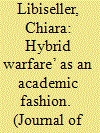

|
|
|
|
|
| Summary/Abstract |
The ‘hybrid warfare’ concept had been coined years earlier, but became fashionable only when it was adopted and adapted by NATO in 2014, after which academic interest suddenly sky-rocketed. Academics often adopted NATO’s understanding of the concept, took for granted its fit for Russian actions, and imported its political assumptions into the academic debate. The fashionability of the term also led to bandwagoning and thus superficial engagement with both the concept and the phenomenon it was applied to. This article outlines this process and its implications for the field of Strategic Studies.
|
|
|
|
|
|
|
|
|
|
|
|
|
|
|
|
| 12 |
ID:
193171
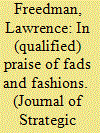

|
|
|
|
|
| Summary/Abstract |
Given the size of the community and the constant flow of new issues and potential security challenges, strategic studies can lend itself to surges of interest in particular topics that then fade into irrelevance, speculative investigations that lead nowhere, or intensive research projects that produce banal conclusions. The durability of much of the research may turn out to be short yet there is still enough that is of value, including insights into the behaviour of organisations and states, concepts that help structure thinking on a range of issues, as well as timely and well-judged policy guidance.
|
|
|
|
|
|
|
|
|
|
|
|
|
|
|
|
| 13 |
ID:
153044
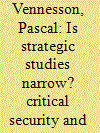

|
|
|
|
|
| Summary/Abstract |
Critical security advocates commonly portray strategic studies as crippled by its narrow focus on Cold War-era military issues, as state-centric and as Western-centric. I argue that this conception of the scope of strategy is flawed and I offer a comprehensive rebuttal by working out the logic of the theories advanced by Carl von Clausewitz and Thomas Schelling. The proponents of critical security overlook the striking expansion of strategy during the Cold War, its longstanding inclusion of competing political actors not just states, as well as its capacity to put Western and non-Western actors in a common analytic frame. By breaking out of the conceptual jails in which strategy has been incarcerated, I seek to reconnect International Relations to strategic thought from which it has become increasingly estranged.
|
|
|
|
|
|
|
|
|
|
|
|
|
|
|
|
| 14 |
ID:
089955
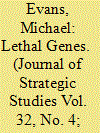

|
|
|
|
|
| Publication |
2009.
|
| Summary/Abstract |
This article examines the way in which urban areas have emerged to become one of the most common environment for armed conflict in the early twenty-first century, The essay argues that, while military professionals have sought to improve their understanding of urban military operation in an ara of global demographic movement from landscape to cityscape, strategic theory lags behind operational practice. Western strategy currently lacks an effective urban lens with policy-relevant analysis neglected within the strategic studies community. The article seeks to identify how an urban strategic focus can be developed in the new millennium. To this end, and in order to provide a context for detailed contemporary analysis, the essay examines the historical nexus between war, strategy and the city; assesses continuity and change in the characteristcs of modern urban military operations;and surveys the professional military debate on the meaning of urban operations.
|
|
|
|
|
|
|
|
|
|
|
|
|
|
|
|
| 15 |
ID:
165096
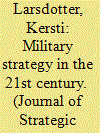

|
|
|
|
|
| Summary/Abstract |
This special issue explores military strategy in the twenty-first century. The articles scrutinise strategy from three perspectives: the study of strategy, and how our understanding of strategy has changed over time; new areas for strategic theory, i.e., areas where the development of war has made strategy become more important, such as peacekeeping operations and cyberspace; and the makers of strategy, more specifically why states choses suboptimal strategies and how wars in the twenty-first century influence strategy makers.
|
|
|
|
|
|
|
|
|
|
|
|
|
|
|
|
| 16 |
ID:
098921
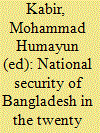

|
|
|
|
|
| Publication |
Dhaka, Academic Press, association with Bangladesh Institute of International and Strategic Studies, 2000, 2000.
|
| Description |
ix, 279 p.
|
| Contents |
Machine generated contents note: 1. Introduction -- Mohammad Humayun Kabir1 -- 2. Theme Paper on Security of Bangladesh in the -- Twenty-first Century -- Muhammad Shahedul Anam Khan12 -- 3. Conventional Security Threats to Bangladesh in -- the 21st Century : The Role of the Armed -- Forces -- Ishfaq Ilahi Choudhury22 -- 4. Defence-Development Dilemma: The Bangladesh -- Context -- Abdur Rob Khan and Munim Kumar Barai 38 -- 5. Strategic and Tactical Lessons of the War of -- Liberation in the Context of the National -- Security of Bangladesh in the 21s' Century -- Syed Muhammad Ibrahim60 -- 6. Agricultural Trade Liberalization under the -- Uruguay Round and Beyond: The Perspectives -- of the Developing Countries with Special -- Reference to Bangladesh -- CAF Dowlah68 -- 7. WTO and Bangladesh's External Trade: -- A Scenario of Opportunities, Perils and Pitfalls -- Muinul Islam107 -- 8. Energy Security of Bangladesh: Issues, -- Perspectives and Prospects -- M. Asaduzzaman128 -- 9. Political Instability in Bangladesh: Security -- Implications -- Syed Anwar Husain145 -- 10. Proliferation of Small Arms and Violence in -- Bangladesh: Societal Insecurity -- N eila H usain 163 -- 11. Poverty and Marginalization in Bangladesh: -- Potentials for Instability -- M .M Akash181 -- 12. Towards a Framework of Sustainable Resource -- Management: The Case of the Chittagong Hill -- Tracts in Bangladesh -- Mizan R Khan196 -- 13. Natural Disasters and National Security -- A. M Choudhury230 -- 14. Arsenic Crisis, Security Concerns, the State and -- the People -- Afsan Chowdhury247 -- 15. National Security of Bangladesh: Thoughts on -- Security Strategies -- Mohammad Humayun Kabir259.
|
| Standard Number |
9840801570
|
|
|
|
|
|
|
|
|
|
|
|
Copies: C:1/I:0,R:0,Q:0
Circulation
| Accession# | Call# | Current Location | Status | Policy | Location |
| 043361 | 355.03305492 21/KAB 043361 | Main | On Shelf | General | |
|
|
|
|
| 17 |
ID:
150114
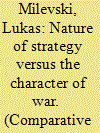

|
|
|
|
|
| Summary/Abstract |
Recent literature in strategic studies has argued for or against the idea that the world is entering an era of new types of conflict. Yet neither side of the debate appears to have considered the primary source of the character of war, which is strategy. Strategy's two main relationships (that between military power and political consequences, and that between interacting adversaries) contribute significantly toward determining the character of any war. Strategy is the basis both for understanding present wars and anticipating future wars. Although useful for defense planners and historians, for practicing strategists, “the character of war” lacks analytical value.
|
|
|
|
|
|
|
|
|
|
|
|
|
|
|
|
| 18 |
ID:
190447
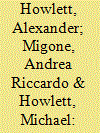

|
|
|
|
|
| Summary/Abstract |
The willingness of defence departments to select the F-35 Joint Strike Fighter (JSF) for their fifth-generation multirole fighter has frequently been analyzed as stemming from the close historical connections allies such as Japan or Canada have with the United States. However, such an approach glosses over or ignores the operation of military procurement processes which are more idiosyncratic and subject to many pushes and pulls from different actors and directions. This article compares the experiences of Australia and Canada in procuring the JSF. Both countries are British Commonwealth members, with a long history of supporting western, and in particular, US alliances. But while Australia has secured its F-35 procurement and the Royal Australian Air Force (RAAF) has already received its F-35s, Canada has only recently overcome a lengthy F-35 procurement battle that remains mired in controversy and will not deliver to the Royal Canadian Air Force (RCAF) an aircraft for several years yet. This comparative case study between Australian and Canadian defence priorities offers a new explanation for this disparity of procurement success based on the need to both create and maintain alignment between government strategic defence policy and military service doctrine if major platform purchasing decisions are to survive.
|
|
|
|
|
|
|
|
|
|
|
|
|
|
|
|
| 19 |
ID:
165362
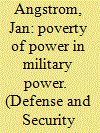

|
|
|
|
|
| Summary/Abstract |
Strategic studies deals intimately with the topic of power. Most scholars in the discipline work with a concept of power as an adversarial zero-sum competition. This is natural and necessary. However, other conceptions of power developed within political science and sociology could enrich strategic studies. Approaching two typical, traditional tasks of strategy – alliance building and war-fighting – this article demonstrates the heuristic mileage of theories of collective power. In particular, we can shed new light on the post-Cold War transformation of NATO as well as state-building as a strategy in counter-insurgencies with new ideas of power. Broadening the palette of theories of power is thus valuable if strategic studies is to prosper as an independent field of study.
|
|
|
|
|
|
|
|
|
|
|
|
|
|
|
|
| 20 |
ID:
140906
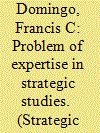

|
|
|
|
|
| Summary/Abstract |
Strategic geniuses are natural strategic thinkers even without much guidance. While the complexity of strategy makes it extremely difficult to formulate and execute, geniuses like Prussian General Carl von Clausewitz or Chinese General Sun Tzu were successful in developing strategies that are still relevant today. However, as strategic history suggests, military strategists do not need to be geniuses to succeed in creating decisive strategies.1 Strategists only need sufficient expertise to be able to outthink and outmanoeuvre their adversaries. Regrettably, strategic expertise has been elusive because existing strategic education and training has not provided the skills and knowledge that are necessary for developing the potential of future strategists. This problem is manifested by the clear absence of academic literature on strategic education and the unreliable performance of public officials.
|
|
|
|
|
|
|
|
|
|
|
|
|
|
|
|
|
|
|
|
|